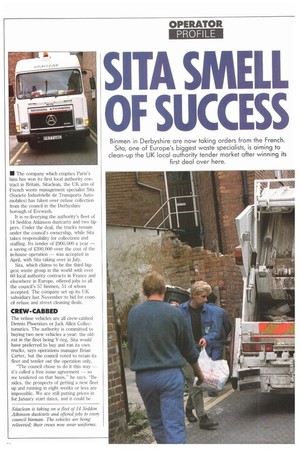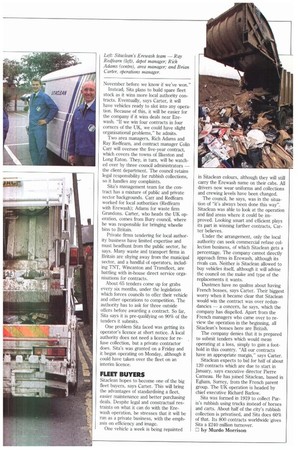SITA SMELL OF SUCCESS
Page 54

Page 55

If you've noticed an error in this article please click here to report it so we can fix it.
• The company which empties Paris's bins has won its first local authority contract in Britain. Sitaclean, the UK arm of French waste management specialist Sita (Societe Industrielle de Transports Automobiles) has taken over refuse collection from the council in the Derbyshire borough of Erewash.
It is re-liverying the authority's fleet of 14 Seddon Atkinson dustcarts and two tippers. Under the deal, the trucks remain under the council's ownership, while Sita takes responsibility for collections and staffing. Its tender of 2900,000 a year — a saving of 2200,000 over the cost of the in-house operation — was accepted in April, with Sita taking over in July.
Sita, which claims to be the third biggest waste group in the world with over 60 local authority contracts in France and elsewhere in Europe, offered jobs to all the council's 57 binmen, 51 of whom accepted. The company set up its UK subsidiary last November to bid for council refuse and street cleaning deals.
The refuse vehicles are all crew-cabbed Dennis Phoenixes or Jack Allen Collectomatics. The authority is committed to buying two new vehicles a year; the oldest in the fleet being V-reg. Sita would have preferred to buy and run its own trucks, says operations manager Brian Carter, but the council voted to retain its fleet and tender out the operation only.
"The council chose to do it this way — it's called a free issue agreement — so we tendered on that basis," he says. "Besides, the prospects of getting a new fleet up and running in eight weeks or less are impossible. We are still putting prices in for January start dates, and it could be Sitackan is taking on a fleet of 14 Seddon Atkinson dustcarts and offered jobs to every council binman. The vehicles are being reliveried; their crews now wear uniforms. November before we know if we've won."
Instead, Sita plans to build spare fleet stock as it wins more local authority contracts. Eventually, says Carter, it will have vehicles ready to slot into any operation. Because of this, it will be easier for the company if it wins deals near Erewash. "If we win four contracts in four corners of the UK, we could have slight organisational problems," he admits.
Two area managers, Rich Adams and Ray Redfearn, and contract manager Colin Can will oversee the five-year contract, which covers the towns of Ilkeston and Long Eaton. They, in turn, will be watched over by three council administrators — the client department. The council retains legal responsibility for rubbish collections, so it handles any complaints.
Sita's management team for the contract has a mixture of public and private sector backgrounds. Can and Redfearn worked for local authorities (Redfearn with Erewash); Adams for waste firm Grundons. Carter, who heads the UK operation, comes from Bury council, where he was responsible for bringing wheelie bins to Britain.
Private firms tendering for local authority business have limited expertise and must headhunt from the public sector, he says. Many waste and transport firms in Britain are shying away from the municipal sector, and a handful of operators, including TNT, Wincanton and Transfleet, are battling with in-house direct service organisations for contracts.
About 65 tenders come up for grabs every six months, under the legislation which forces councils to offer their vehicle and other operations to competition. The authority has to ask for three outside offers before awarding a contract. So far, Sita says it is pre-qualifying on 90% of the tenders it submits.
One problem Sita faced was getting its operator's licence at short notice. A local authority does not need a licence for refuse collection, but a private contractor does. Sita's was granted on a Friday and it began operating on Monday, although it could have taken over the fleet on an interim licence.
FLEET BUYERS
Sitaclean hopes to become one of the big fleet buyers, says Carter. This will bring the advantages of standardising a fleet, easier maintenance and better purchasing deals. Despite legal and constractual restraints on what it can do with the Erewash operation, he stresses that it will be run as a private business, with the emphasis on efficiency and image.
One vehicle a week is being repainted in Sitaclean colours, although they will still carry the Erewash name on their cabs. All drivers now wear uniforms and collections and crewing levels have been changed.
The council, he says, was in the situation of "it's always been done this way". Sitaclean was able to look at the operation and find areas where it could be improved. Looking smart and efficient plays its part in winning further contracts, Carter believes.
Under the arrangement, only the local authority can seek commercial refuse collection business, of which Sitaclean gets a percentage. The company cannot directly approach firms in Erewash, although its rivals can. Neither is Sitaclean allowed to buy vehicles itself, although it will advise the council on the make and type of the replacements it wants.
Dustmen have no qualms about having French bosses, says Carter. Their biggest worry when it became clear that Sitaclean would win the contract was over redundancies — a concern, he says, which the company has dispelled. Apart from the French managers who came over to review the operation in the beginning, all Sitaclean's bosses here are British.
The company denies that it is prepared to submit tenders which would mean operating at a loss, simply to gain a foothold in this country. "All our contracts have an appropriate margin," says Carter.
Sitaclean expects to bid for half of about 120 contracts which are due to start in January, says executive director Pierre Carneau. He has joined Sitaclean, based in Egham, Surrey, from the French parent group. The UK operation is headed by chief executive Richard Barlow.
Sita was formed in 1919 to collect Paris's rubbish using trucks instead of horses and carts. About half of the city's rubbish collection is privatised, and Sita does 60% of that. Its 800 contracts worldwide 'gives Sita a £240 million turnover.
by Murdo Morrison






















































































































































